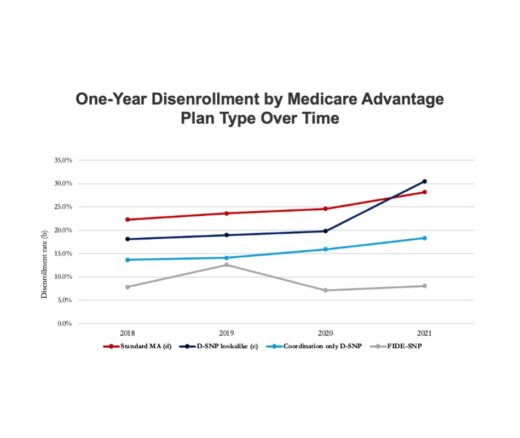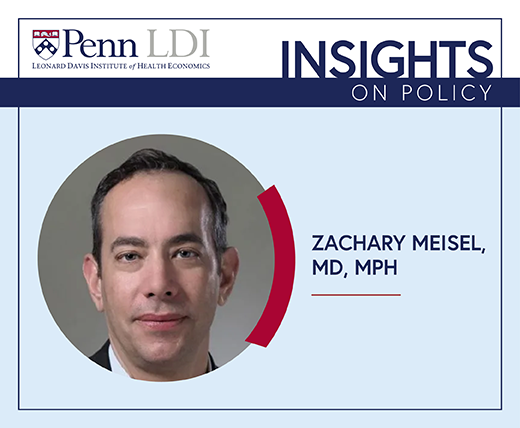Fragmented Geographic Distribution of Providers Suggests Limited Access to Basic Health Care for Dual Medicaid-Medicare Beneficiaries
Less Than 1% of Clinical Practices Provide 80% of Outpatient Services for Dually Eligible Individuals
Blog Post
In the past year, there’s been a flurry of changes in drug pricing, including a new congressional bill that “arguably represents the greatest change to U.S. drug price regulation ever,” according to a recent commentary in Health Affairs Forefront. In passing the Inflation Reduction Act in August 2022, Congress enabled Medicare to negotiate some prescription drug prices. The measure also required a $35 monthly cap on insulin’s copay for Medicare Part D beneficiaries. Here are some recent drug pricing developments, as LDI prepares for its conference “A Prescription for the Future of Drug Pricing” on May 5.
Pharmacy benefit managers (PBMs) have drawn heavy scrutiny from researchers and policymakers. PBMs are responsible for negotiating drug prices between drugmakers and health insurers. In exchange for ensuring favorable placement on the formulary (a list of drugs that an insurer is willing to cover), the manufacturers give rebates to the PBMs, who in turn, pocket some profit. The murkiness in the process is the source of much controversy, and PBMs were the subject of a Senate Committee on Finance hearing on March 30. One of the five witnesses was LDI Senior Fellow Lawton Robert Burns, the James Joo-Jin Kim Professor of Health Care Management, and author of a 650-page textbook on PBMs and group purchasing organizations (GPOs).
| For more on this topic, see Drug Pricing: Policy and Politics, a virtual LDI seminar, Regulating Prescription Drug Prices by Aaron Glickman, MPA, and Are Costly New Prescriptions Drugs Worth the Price by Jen Fisher Wilson. |
Burns sought to dispel three myths about PBMs during the hearing. According to his written testimony, he discussed PBMs negative portrayal as “widely mistrusted” intermediaries. Historically, PBMs “were tied to health insurers, just like they are today.” They were not “rogue agents.” Additionally, PBMs have used the same contracting tools over time (e.g. rebates, formularies, administrative fees), and these are not as novel as some have alleged.
Burns also addressed the claim that PBM rebates are the cause of rising list prices for drugs. He stated that drug manufacturers raise prices “because they can.” Additionally, Burns noted that “a main driver in the list prices of brand drugs is not PBM rebates but rather federal reimbursement policies,” which he thinks are too generous in the catastrophic coverage phase of Medicare Part D.
Finally, Burns noted that vertical integration in health care is not the threat that critics make it out to be. With companies owning their own retailers, clinics, and PBMs (e.g. CVS and Aetna), it has become increasingly common. However, Burns noted, “vertical integration is not a guaranteed success. … When pursued by hospitals and physicians, there has been a lot of red ink and unwinding of the combinations.”
Burns has also been asked to advise the Senate Committee on Health, Education, Labor, and Pensions (HELP) on PBMs.
On March 22, Moderna CEO Stéphane Bancel testified before the Senate HELP committee on the company’s plan to quadruple the price of its COVID-19 vaccine to $130 per dose. Bancel justified the price hike, maintaining that this vaccine was a different product from the original. He also said a 90% drop in consumer demand drove much of the increase.
What followed was a bruising exchange. HELP’s chair, Sen. Bernie Sanders, I-Vt., repeatedly attacked the increase, noting that the federal government gave $12 billion to fund Moderna’s “research, development, and [federal] procurement” of the vaccine. In a proposal reminiscent of federal defense contracting, Sanders suggested that the “government instead [pay] for companies’ research, enough to ensure they make a reasonable profit,” and then make the medications affordable for all those who need them. Bancel gave a noncommittal answer, saying that he needed more details. Several senators also criticized Moderna’s proposed patient assistance program for the vaccine. Bancel was better received by Sen. Bill Cassidy, R-La., who, while complaining about high drug prices, warned about the dangers of demonizing an industry. Capitalism “is the reason hundreds of thousands, if not millions, of Americans are alive today,” he said. Sen. Mitt Romney, R-Utah, also praised Moderna as a success story.
Danish company Novo Nordisk recently announced dramatic price cuts for its insulin products. According to the Wall Street Journal, the company will reduce the cost of “NovoLog insulin by 75% and the prices for Novolin and Levemir by 65% starting in January 2024.” This act follows in the wake of pharmaceutical giants Eli Lilly and Sanofi deciding to reduce insulin prices. At Lilly, insulin products’ prices fell by 70%, and the company expanded its access to a $35 monthly cap for uninsured patients’ out-of-pocket costs.
Diabetes afflicts almost 38 million Americans, or, about 11% of the population. And some 8 million people—including all type 1 patients and many with type 2—need insulin. Discovered in 1921, the drug has never gone generic in the traditional sense (the same chemistry and efficacy as brand-name drugs, but sold for much less.) The market remains dominated by expensive brands, according to the American Diabetes Association. As a result, insulin’s price has rapidly ballooned out of control leading some patients to risk their health by rationing their prescriptions.
The price cuts by the three big makers, along with pressure from the Inflation Reduction Act, look to make insulin even cheaper than California’s Civica nonprofit, which aims to produce a low-cost version of the drug to alter the market, the New York Times reported. Still, the state is pressing ahead, arguing that its disruption efforts will continue to drive down prices especially for those on high-deductible health plans and the uninsured—an estimated 12% and 7% respectively—of California’s insulin users.
Starting in April 2023, the Centers for Medicare and Medicaid Services will “subject 27 drugs to inflation penalties.” Per the Inflation Reduction Act, drug companies are now required to pay rebates for Medicare Part B drugs, whose price outstripped inflation. While the law applies to Part D drugs, details are still being worked out. Five of these drugs are owned by Pfizer, and another one is the blockbuster AbbVie medication, the immunosuppressant HUMIRA.
Join Penn LDI and register here for the one-day conference on the future of drug pricing, amid dramatic policy changes and innovations in the pharmaceutical market. The conference brings together voices from academia, industry, and policymakers.

Less Than 1% of Clinical Practices Provide 80% of Outpatient Services for Dually Eligible Individuals

New Findings Highlight the Value of 12-Month Eligibility in Reducing Care Gaps and Paperwork Burdens

Chart of the Day: Fully Integrated D-SNPs Kept These Vulnerable Patients Enrolled, a New Study Finds

Democrats Must Go Beyond Reversing Trump-Era Cuts With a New Strategy to Streamline Coverage, Reduce Waste, and Expand Access to Medicaid

A Crisis in Maternal Care is Unfolding—and it’s Hitting Rural and Urban Communities Alike

Letter: Delivered to House Speaker Mike Johnson and Majority Leader John Thune